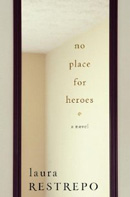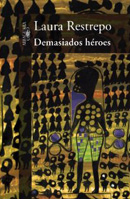


Nan A. Talese, hardcover, 9780385519915
Alfaguara, paperback, 9781603966429 (Spanish edition)
Lolé. Quiero saber como fue—el episodio oscuro. (Lole. I want to know how it was—the dark period.)
Mateo Iribarren addresses his mother, Lorenza, about what happened during the dark period; the period when his father kidnapped him, leaving his mother behind. And thus she begins:
We follow as she recounts her love story. It was a relationship formed under the most dire circumstances within Argentina's "Dirty War"; two undercover militants meeting to exchange information and ending up in love. Now, back in Buenos Aires, Mateo searches not for the militant Lorenza once knew, but for his father, Ramón. Of different generations, Lorenza and Mateo take part in an untraditional balance between a woman who lived under constant fear of Videl's dictatorship, and a young boy who has known nothing but the protection of his mother in the comfort of the Nineties.
Restrepo adds a wonderful maternal touch to the "Dirty War", as she tries to explain to her son who his father is. Full of wit, charming puns and a constant stream of sharp dialogue, she manages to engage us and persuade us into thinking that we know Ramón's true character. As Mateo states himself, though: "you know nothing about who you're speaking of". But when blinded by both political views and love, how can one truly know the person they are with? It is up to Mateo to make up his mind on who his father truly is.
At the end of it all, perhaps the quotes at the beginning of this novel are the best indicators of Mateo's conflict. Because for Mateo, he is not looking to understand the bad man that kidnapped him at an early age, nor is he looking for a hero during a difficult political era. He is simply looking for his father, a man of flesh and blood. And as we follow these two characters, we find ourselves looking at the humanity behind those that survived the "Dirty War".
Todo el mundo tiene derecho a pensar que su padre es un buen tipo. (Everyone has a right to think that their father is a good person.) —Félix Romero
En este momento no estoy para escuchar cuentos de héroes. (At this time I don't want to hear about heroes.) —Elias Khoury
